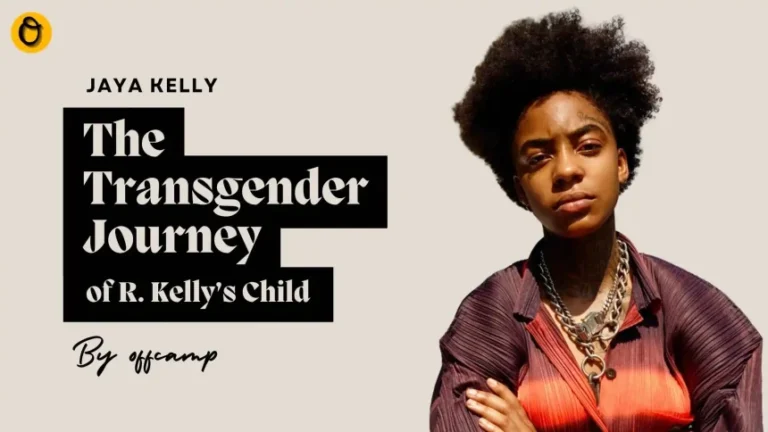Early life and family background
Jaya Kelly was born around 2000 into a household where music and movement were part of daily life. Their mother worked as a dancer and choreographer, and their father was a well-known R&B singer. Growing up in that environment meant early exposure to instruments, rehearsals, and the realities of a public life. From an early age Jaya showed curiosity about sound, learning piano, trumpet, and clarinet. Family memories describe long practice sessions and a steady focus on craft. Those early years established a foundation in musicianship that would later shape their songwriting and arrangements.
Coming into identity
Jaya’s public story took a complicated turn in adolescence when they began to speak openly about gender. That period was difficult. They have spoken about depression and about a time when inpatient care was necessary. Those experiences shaped how Jaya thought about identity. Rather than adopting a single, fixed label, they have described their journey as evolving. Public conversations about gender and mental health sometimes overshadowed their music, and Jaya had to learn how to hold space for themselves while music and therapy provided ways to rebuild.
Music as refuge and expression
Music remained the clearest refuge. Jaya used instruments and songwriting to explore emotions that felt too big for conversation. Their early recordings favor intimate arrangements: piano-led tracks, bare rhythms, and vocal parts that leave room for breathing. The aesthetic is not flashy. Instead the focus is on lyric and tone, on the way a single chord can underline a line about longing or confusion. In performance, Jaya tends to avoid grand gestures and to let the songs carry the mood. Recording sessions often emphasize nuance—small shifts in phrasing, a quiet brass line, the way silence frames a lyric.
Artistic style and notable work
Across their early releases, Jaya’s work sits between alternative R&B, minimalist pop, and singer-songwriter traditions. Songs emphasize personal narrative, small details, and emotional honesty. Instrumentation often includes the brass and woodwind training they received in childhood, but those elements appear as texture rather than showpieces. Lyrically the work leans inward, with recurring themes of memory, recovery, and the difficulty of naming oneself. As an artist, Jaya seems driven less by commercial success and more by a desire to refine craft and to build a body of work that ages honestly. Their releases often feel like chapters in a longer story rather than isolated singles.
Public scrutiny and mental health
Growing up in the public eye magnified personal struggles. Jaya has been candid about depression and about feeling overwhelmed by media attention. The combination of public curiosity and private crisis created pressure points that were hard to manage. Speaking openly about these things carried risk, but it also created an honest record of someone trying to recover while being watched. For many listeners, Jaya’s admissions about mental health became a point of connection; for others, headlines blurred the music. That tension between curiosity and care has been a defining condition of their public life.
Choosing independence
Over time Jaya made choices that prioritized creative control and personal stability. They experimented with different names and pronouns at different stages, reflecting an ongoing process rather than a definitive statement. Friends and family describe their mother as a steadying presence during difficult seasons. Artistically, Jaya has focused on building a small but committed audience by releasing material that feels true rather than market-driven. The emphasis on careful arrangement, songwriting, and live nuance has helped them cultivate listeners who return for depth rather than flash. That approach allows artistic risks that might not fit mainstream formulas.
Media framing and how to cover the story
The story of anyone connected to a celebrity can be reduced to gossip unless journalists commit to context and care. Fair coverage of Jaya centers the music first, respects shifts in language and identity, and avoids speculation about private family matters. Reporting that treats identity as a headline without attention to the person behind the pronouns does a disservice. Balanced coverage gives space to the artist’s statements, situates their artistic output, and acknowledges influences without turning them into the whole story.
Why Jaya’s story matters
Beyond the celebrity connection, Jaya’s experience highlights a broader cultural shift in how younger people explore identity. Their openness about mental health and their steady commitment to music offer a model for audiences who are tired of sensationalism and who want honesty instead. Jaya represents a generation that expects identity to be fluid and that values creative authenticity. Their work matters not because of a famous last name but because it invites listeners into a careful, often vulnerable conversation. The songs offer company to anyone navigating change, uncertainty, or the slow work of recovery.
What to listen for next
If you want to follow Jaya’s growth as an artist, listen for stripped-back tracks that foreground piano and voice. Pay attention to the moments where instrumental color—brass or clarinet—enters quietly to change the mood. Lyrically, expect recurring interests in memory, healing, and the small rituals that hold life together. Live performances often emphasize mood over spectacle, which makes them rewarding for listeners who appreciate detail and emotional honesty.
A closing note
If you want to follow their work, seek out tracks on independent music platforms, attend small shows and support artists who take creative risks. This kind of support helps artists keep making work on their own terms.
Jaya Kelly’s story is still unfolding. They are an artist trying to be heard on their own terms in a landscape that frequently reduces people to family histories. The most respectful way to engage is to listen closely to the music, to read interviews that prioritize the artist’s words, and to treat identity as part of a living process rather than a fixed label. Over time, the songs will likely be the best measure of what Jaya is becoming. For now, the music and the candidness about identity remain the clearest signs of growth.
